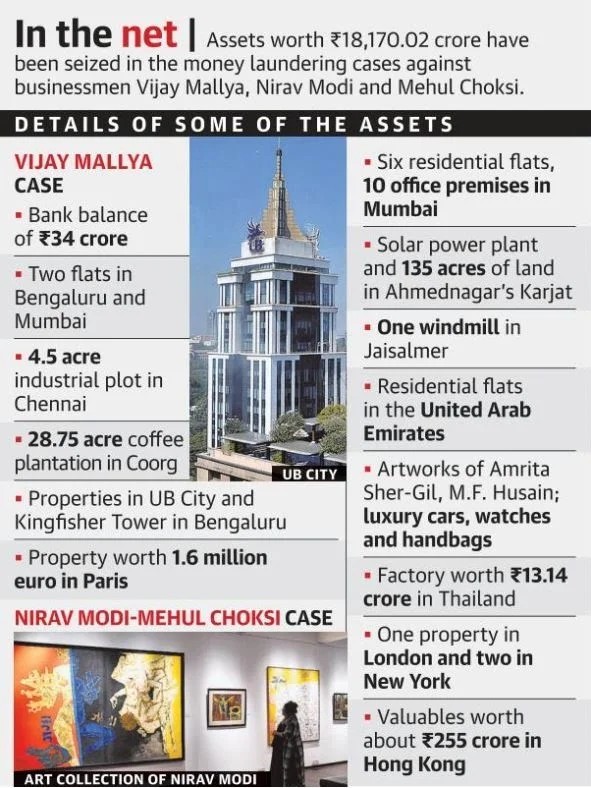Ahmedabad
(Head Office)Address : 506, 3rd EYE THREE (III), Opp. Induben Khakhrawala, Girish Cold Drink Cross Road, CG Road, Navrangpura, Ahmedabad, 380009.
Mobile : 8469231587 / 9586028957
Telephone : 079-40098991
E-mail: dics.upsc@gmail.com

Enforcement Directorate
News: Recently, The Supreme court ruled that the 3rd extension given to the present ED chief was illegal and in violation of its judgement in 2021.
Background:
• The present ED Chief was first appointed as the ED Director in 2018, for a fixed period of two years.
• Days before his tenure was to end, the President modified the previous order retrospectively and changed Mishra’s tenure to three years.
• In November 2021, the Supreme Court upheld the extension granted to ED Chief beyond two years.
• In December 2021, the Parliament passed two bills - The Central Vigilance Commission (Amendment) Bill, 2021 and Delhi Special Police Establishment (Amendment) Bill, 2021. These bills provide that the tenure of ED and CBI chiefs could be extended by up to three years after the mandated term of two years.
• Hence, under the amended law, he got an extension from November 2021 to November 2022. Further, he got the third extension by a notification till November 2023. This extension and the amendments to the CVC and DSPE Act were challenged before the Supreme Court.
• While the ED chief has been asked to continue office until 31st July 2023, the Supreme court upheld the amendments under the CVC Bill, 2021 and DPSE Bill, 2021.
What is Enforcement Directorate?
• ED is a multi-disciplinary organization mandated with investigation of offences of money laundering and violations of foreign exchange laws.
• It is a non-statutory body under the Department of Revenue, Ministry of Finance.
• The ED enforces the following Acts - The Prevention of Money Laundering Act, 2002 (PMLA), The Foreign Exchange Management Act, 1999 (FEMA), The Fugitive Economic Offenders Act, 2018 (FEOA) and is a sponsoring agency under COFEPOSA.
How ED is different from other investigative agencies?
• A statement made to ED is admissible as evidence in court but a similar statement made to police officer isn’t admissible as evidence in court.
• Section 50 of the PMLA provides powers of a civil court to the ED authorities for summoning persons suspected of money laundering and recording statements. However, the Supreme Court held in Vijay Madanlal Choudhary v. Union of India (2022) that ED authorities are not police officers and an inquiry under the Section 50 of the PMLA is not ‘investigation’ in strict sense of the term for initiating prosecution.
What is the significance of ED?
• It helps in protecting the national security, sovereignty, and integrity of India by curbing the illicit flow of funds that may finance terrorism, insurgency, or other anti-national activities.
• It helps in recovering the public money that has been siphoned off by corrupt individuals or entities, and restoring the assets to the rightful owners or the state.
• Deters offenders from indulging in economic crimes.
• The ED contributes to the fight against corruption.
What are the criticism levelled against ED?
It has been facing criticism from various quarters for its alleged political bias, lack of transparency, low conviction rate, and harassment of innocent people.
• It enjoys wider power compared to other investigative agencies. For example, statement before ED is admissible in court of law as discussed above and all offences under PMLA are non-baillable.
• A report by India Today revealed that out of the 5,422 cases of investigation initiated by the ED under the Prevention of Money Laundering Act 2002, only 25 people have so far been convicted, raising questions about the efficacy and accountability of the agency.
• Critics have alleged that the ED has been misusing the foreign funding law to crack down on dissenting voices and human rights defenders.
• Political Bias – Weaponising of ED to target opposition leaders.
• There is a lack of transparency in the way the ED functions. It is not known how the ED chooses its cases and what is the basis of picking a particular case. Also, ECIR, the equivalent of FIR, is considered an internal document and not given to the accused.
| ECIR -An ECIR is an Enforcement Case Information Report, which is akin to a First Information Report (FIR) in criminal cases. It is the first official document recorded by the ED before beginning its investigation. |
Way Forward
• Notwithstanding the significance of ED in its role in preventing corruption and its sustained fight against money laundering, it is important to ensure that powers of ED are not misused against political opponents.

Address : 506, 3rd EYE THREE (III), Opp. Induben Khakhrawala, Girish Cold Drink Cross Road, CG Road, Navrangpura, Ahmedabad, 380009.
Mobile : 8469231587 / 9586028957
Telephone : 079-40098991
E-mail: dics.upsc@gmail.com
Address: A-306, The Landmark, Urjanagar-1, Opp. Spicy Street, Kudasan – Por Road, Kudasan, Gandhinagar – 382421
Mobile : 9723832444 / 9723932444
E-mail: dics.gnagar@gmail.com
Address: 2nd Floor, 9 Shivali Society, L&T Circle, opp. Ratri Bazar, Karelibaugh, Vadodara, 390018
Mobile : 9725692037 / 9725692054
E-mail: dics.vadodara@gmail.com
Address: 403, Raj Victoria, Opp. Pal Walkway, Near Galaxy Circle, Pal, Surat-394510
Mobile : 8401031583 / 8401031587
E-mail: dics.surat@gmail.com
Address: 303,305 K 158 Complex Above Magson, Sindhubhavan Road Ahmedabad-380059
Mobile : 9974751177 / 8469231587
E-mail: dicssbr@gmail.com
Address: 57/17, 2nd Floor, Old Rajinder Nagar Market, Bada Bazaar Marg, Delhi-60
Mobile : 9104830862 / 9104830865
E-mail: dics.newdelhi@gmail.com